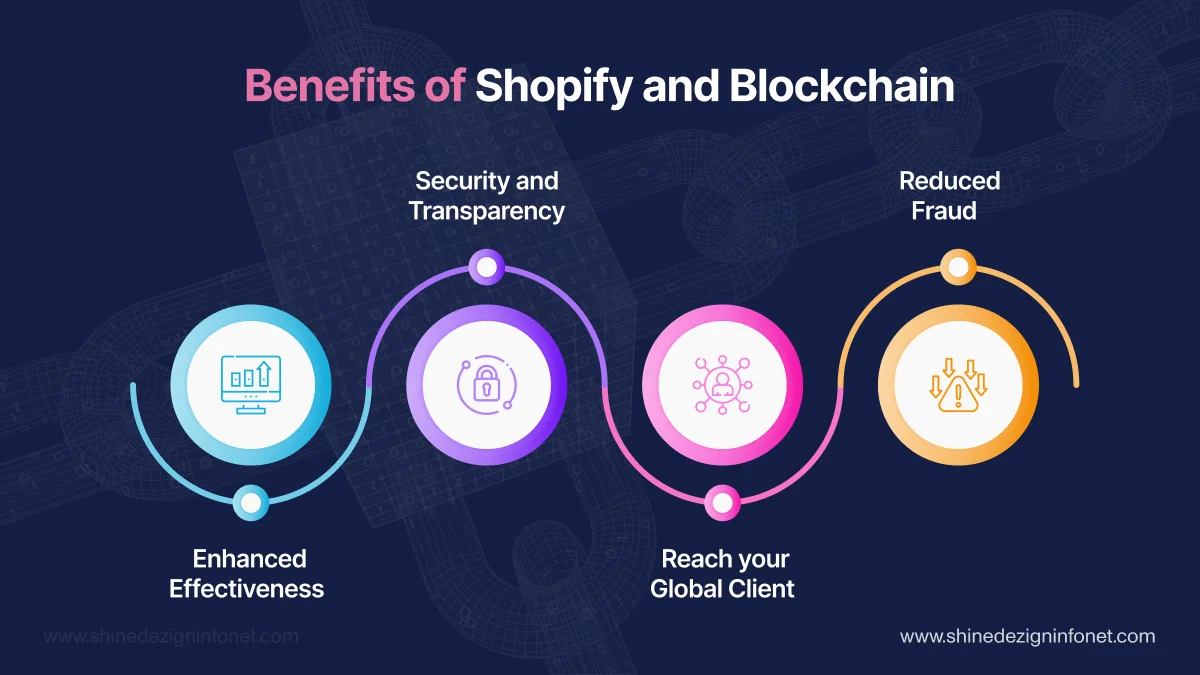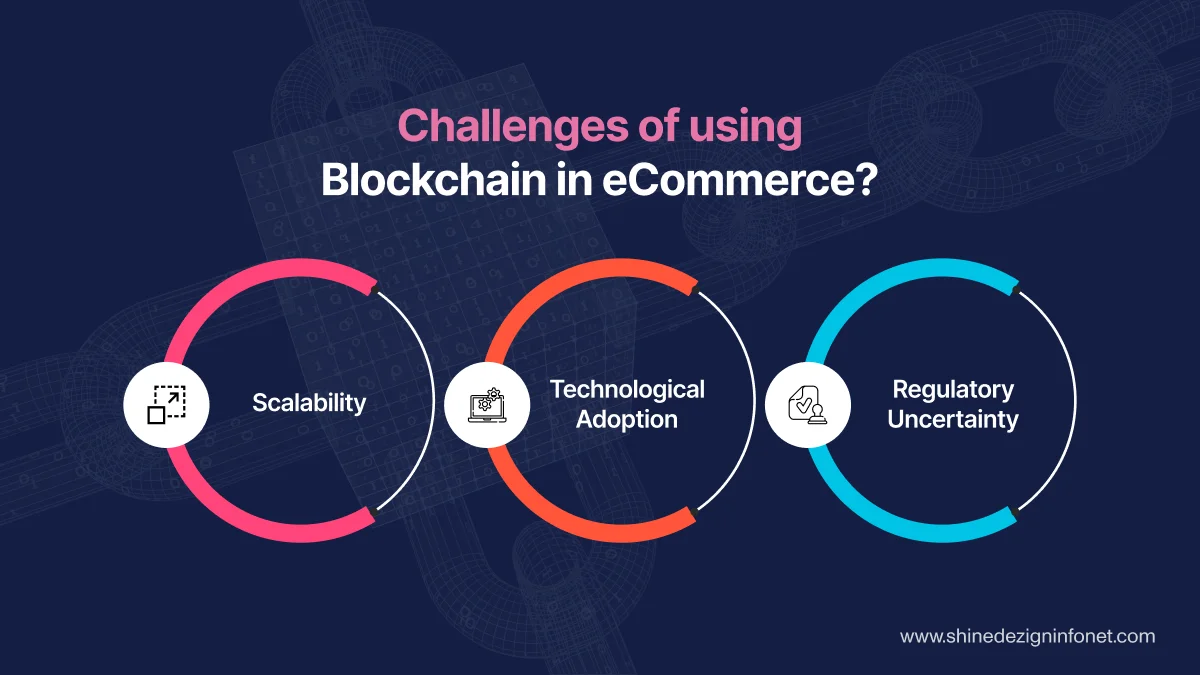Table of Contents
In recent years, Blockchain technology has become trending. It has developed and been designed into a ground-breaking technology with the potential to expand to different sectors. Also, eCommerce is mainly the market leader. Shopify is one such sector that can profit from blockchain growth. Therefore, let’s explore how blockchain in eCommerce can impact your Shopify store.
What is Blockchain Technology?
Blockchain technology is a decentralized ledger system that allows transparent, secure and tamper-proof transactions. Also, just like traditional ledger systems, managed by a single central authority, blockchain easily operates on a peer network where different nodes record and verify transactions.
Benefits of Shopify and Blockchain
Security and Transparency
By utilizing Blockchain technology, Shopify could offer a secure and Transparent record of transactions between clients and sellers. Doing so reduces the likelihood of card and fraud refunds, and trust may rise. By using blockchain technology, Shopify may provide a secure transaction record that is available to both the clients and the sellers.
Reduced Fraud
The possibility of fraud and card refunds is one of the most vital issues e-commerce businesses have. By providing a safe and transparent record of all transactions, Shopify may easily employ blockchain to lower this risk. This reduces the scam transactions, which would be beneficial to sellers and buyers.
Enhanced Effectiveness
Blockchain can increase eCommerce organization’s productivity. Also, businesses can save money and time by offering a secure and visible record of transactions, which will cut down on chargebacks and disputes. This would easily free up resources to easily focus on other factors of the company’s operations like marketing and product development.
Reach your Global Client
Banks in developing countries often do not offer security systems to their clients. By utilizing cryptocurrencies and Blockchain, they can bypass banking intermediaries, offering access to a broader range of eCommerce retailers. In addition, forward-thinking companies can enter new emerging markets by utilizing cryptocurrency and blockchain.
How Blockchain enhance eCommerce Security?
eCommerce sites and blockchain technologies establish an economic network that benefits both clients and online Shopify stores. Therefore, utilizing distributed ledger technology in their business processes, online merchants find new ways to serve their clients. Let’s check out how blockchain expands eCommerce Security:
Decentralization
Blockchain distributes it across numerous computers worldwide. This decentralization means there’s no single point of failure, making it more incredibly challenging for hackers to breach the system.
Also, by eliminating a centralized target, blockchain creates a protective wall for clients’ data. Hackers would require altering data across a majority of the clients in the network, a task that is virtually impossible given the vast and dispersed nature of Blockchain networks. Also, this unique architecture significantly bolsters the security of eCommerce transactions.
Transparency
Each transaction, once confirmed, you can view it publicly. This open visibility can easily expand a client’s trust. For consumers, the ability to verify transactions adds an extra layer of confidence and security. They can confirm the transaction legitimacy, enabling they aren’t victims of fraudulent activities.
Also, for businesses, this transparency boosts a trustworthy relationship with their clients. By providing a transaction process, businesses can assure clients that their transactions are secure, and their data is safe.
Immutability
Another key feature of Shopify blockchain is its immutability. A transaction becomes permanent after its verification. No party can easily alter or delete the transaction, which offers a powerful deterrent against fraud and transaction tampering.
This immutability is especially useful in identity theft protection. Blockchain in ecommerce can safe and securely save personal data, this reduces the chance of fraud or manipulating data. In addition, it gives a robust and multi-faceted security solution.
Challenges of using Blockchain in eCommerce?
There’s no doubt that Blockchain in eCommerce comes with robust security and eCommerce security.
Scalability
In today’s full-paced world, most Blockchain allows for a limited number of transactions per second. Also, Blockchain needs substantial computational power to process and validate transactions. So, the scalability issues go beyond the transaction quantity.
As traditional payment system can process more than thousand transactions per second, while most blockchains currently lag behind this benchmark. This limitation can easily pose significant challenges to blockchains’ integration into fast-paced eCommerce environments.
Technological Adoption
Both Clients and businesses need to understand and trust blockchain for the technology to become mainstream. It needs a certain level of technological know-how and digital literacy, which can be an obstacle for users.
Also, Clients lack trust that blockchain transactions are secure and safe. They need more information and an understanding of how blockchain complements other security tools like identity theft protection software. On the business side, you need to understand the requirements of blockchain technology and how you can effectively integrate it into existing systems.
Regulatory Uncertainty
Laws and regulations vary by country and are failing with this rapidly advancing technology. This regulatory uncertainty can pose a challenge for businesses looking for blockchain integration.
More concerns and questions about responsibility, enforcement, and legal jurisdiction are still unanswered in many cases. These uncertainties can discourage some businesses from fully adapting blockchain technology in eCommerce.
Conclusion
The incorporation of blockchain technology also highlights a significant advancement in strengthening the security for the ecommerce industry. Therefore, using the decentralization technology of blockchain and unalterable characteristics, it effectively tackles vital security issues by offering tamper-resistance transaction records. It is safeguarding confidential client data and decreasing the susceptibility to fraudulent activities.


















